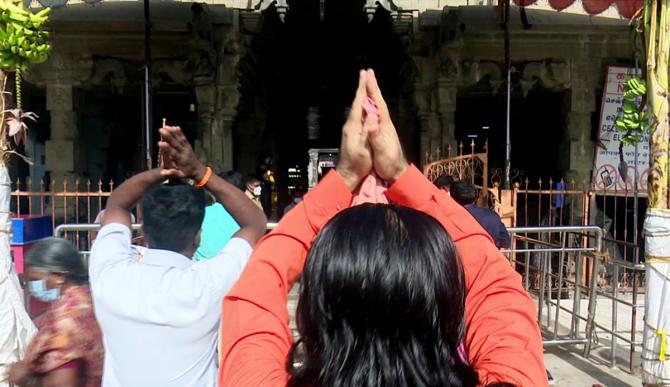A district collector leads Dalits into a temple in Tamil Nadu, which is then sealed. A Ganesh Nadar finds out why.

In December last year, Pudukkottai Collector Kavita Ramu led Dalits into an Ayyanar temple in Vengavayal village, Tamil Nadu. The upper castes protested this move and the temple was sealed for worship later.
Professor C Lakshmanan, convenor, Dalits Intellectual Conclave, tells this correspondent that he led a fact-finding team to the village after the incident. And what he found was not what was available in the public domain.
"The Dalits in this village have been living in harmony for decades with the upper castes. They have their own temple and are not interested in entering this particular temple," says Professor Lakshmanan.
"We were informed that the collector stopped at Erayur village, which is 1.5 km from Vengavayal village, brought Dalits from that village and entered the temple with them," the professor claims.
"In this village, the Dalits have a separate water tank. Faeces were found floating in this tank. The villagers realised this only after children fell sick after consuming the water from this tank," he says.
"The culprits have still not been found and so to divert attention from this crime against humanity, the collector resorted to this," claims Professor Lakshmanan.
"Madam, you led Dalits into a temple, which village did these Dalits belong to?" this correspondent asked Collector Kavita Ramu who refused to answer the question.
Professor Lakshmanan, who retired from the Madras Institute of Development, says the struggle for Dalit rights started much before 'Periyar' E V Ramaswamy Naicker appeared on the scene.
There has been a struggle for common spaces, roads, water, schools, grazing land and burial sites in Tamil Nadu. When the Justice Party ruled the state, it passed a law allowing temple entry for all.
"A law alone cannot make a change, implementation is important," says Professor Lakshmanan. "Periyar was an atheist, he was not concerned about temple entry. It was the Congress under Rajaji (Chakravarti Rajagopalachari, later independent India's first and only governor general) who led the lower castes into the famous Meenakshi temple in Madurai."
About the faeces-drinking water issue, he says, "30 families were affected, but the government paid compensation to only one family."
"Lately, there were illicit liquor deaths in Tamil Nadu. The government wanted a diversion," the professor claims, "and so the temple entry. A second temple was also sealed for the same reason."
In the Vanniyar belt of North Tamil Nadu, regular tussles can be seen between the Pattali Makkal Katchi and the Viduthalai Chiruthaigal Katchi. This is more political than a caste problem as both political parties are doing their best to get more votes. Neither can win a single seat to the assembly unless they are aligned with one of the Dravidian majors, the DMK and the AIADMK.
According to Professor Lakshmanan, seeking entry into temples is a futile exercise. He highlights the fact that though the government had set up various committees to solve this problem, the committees did not have a single Dalit as a member.









 © 2025
© 2025